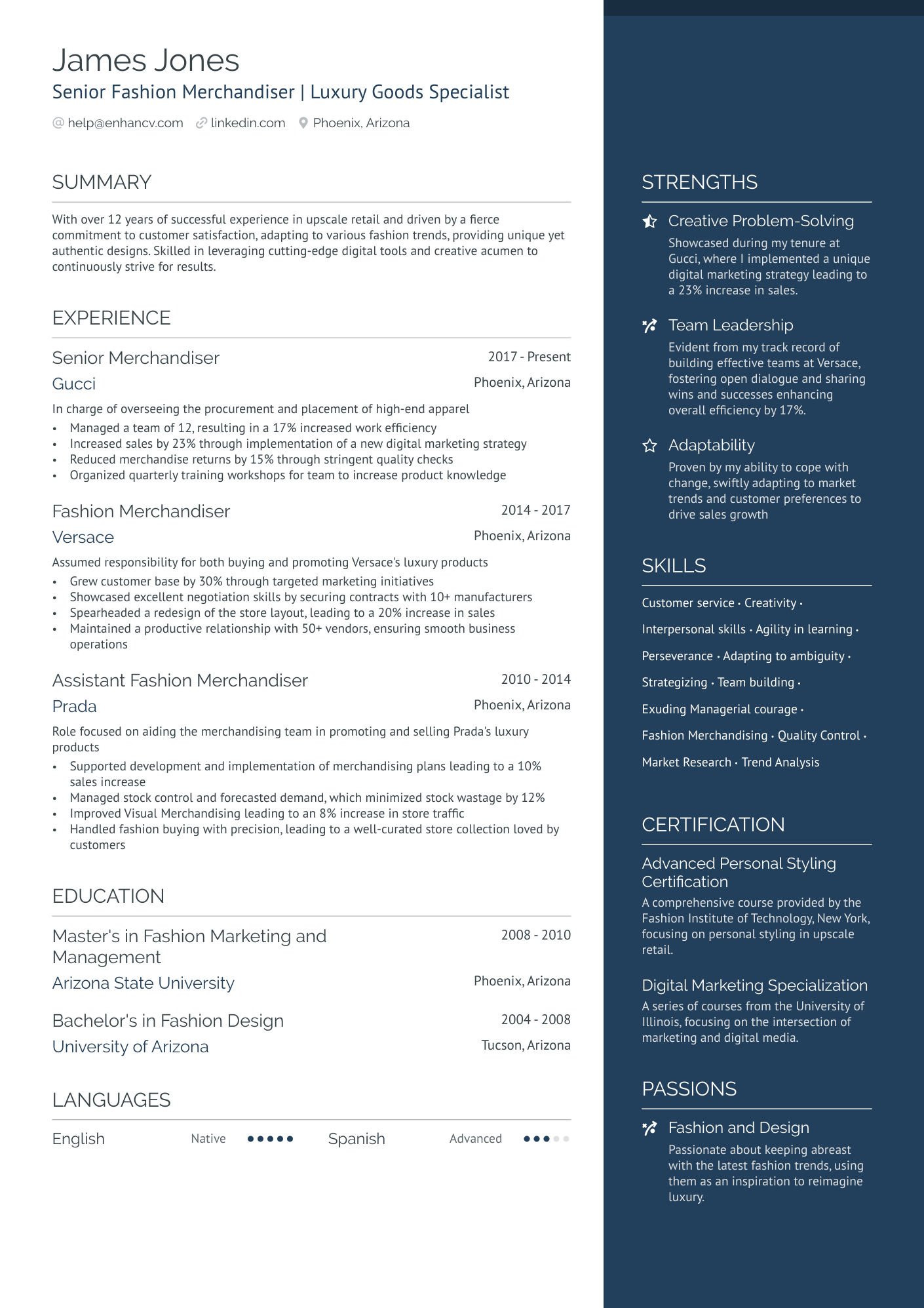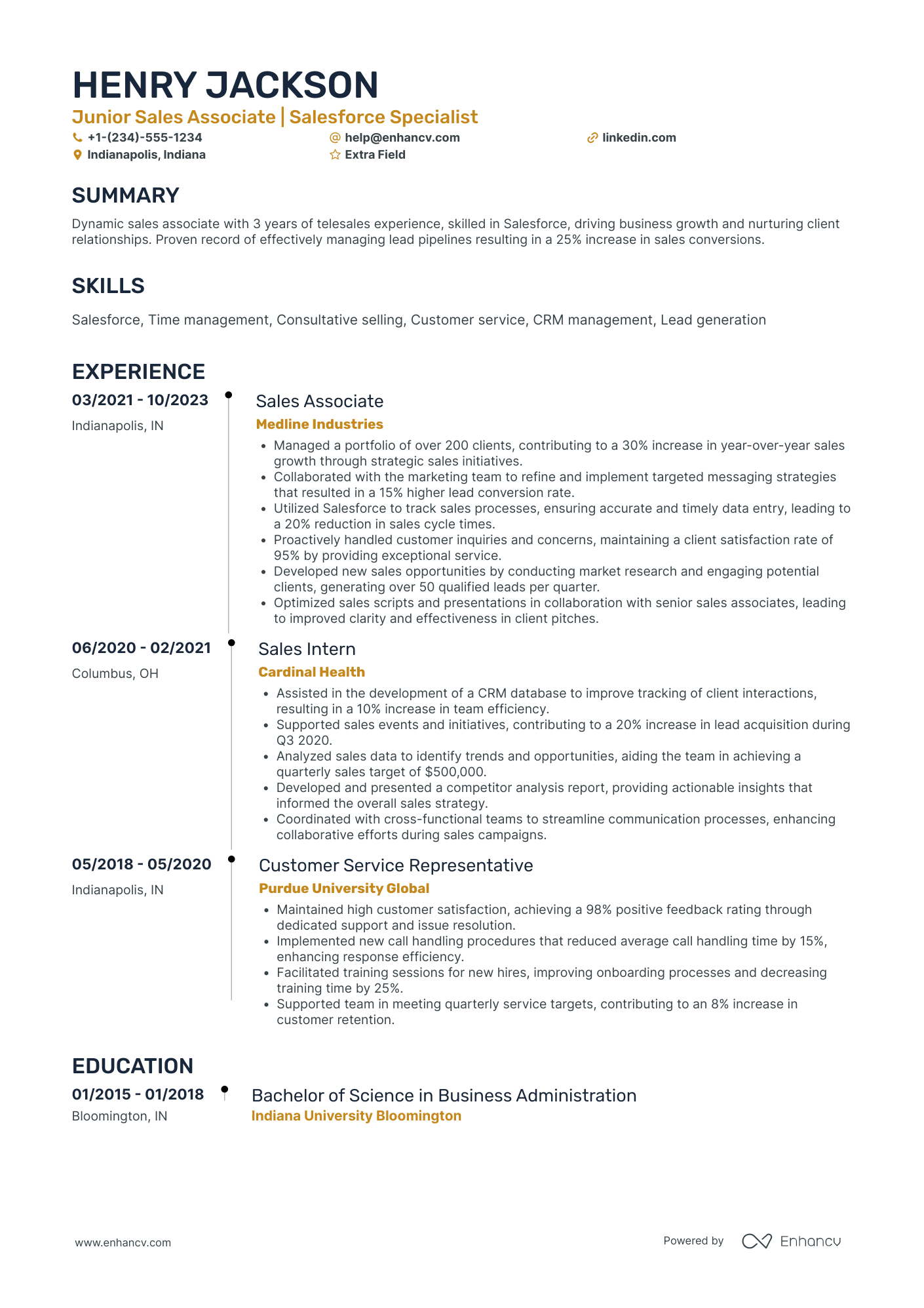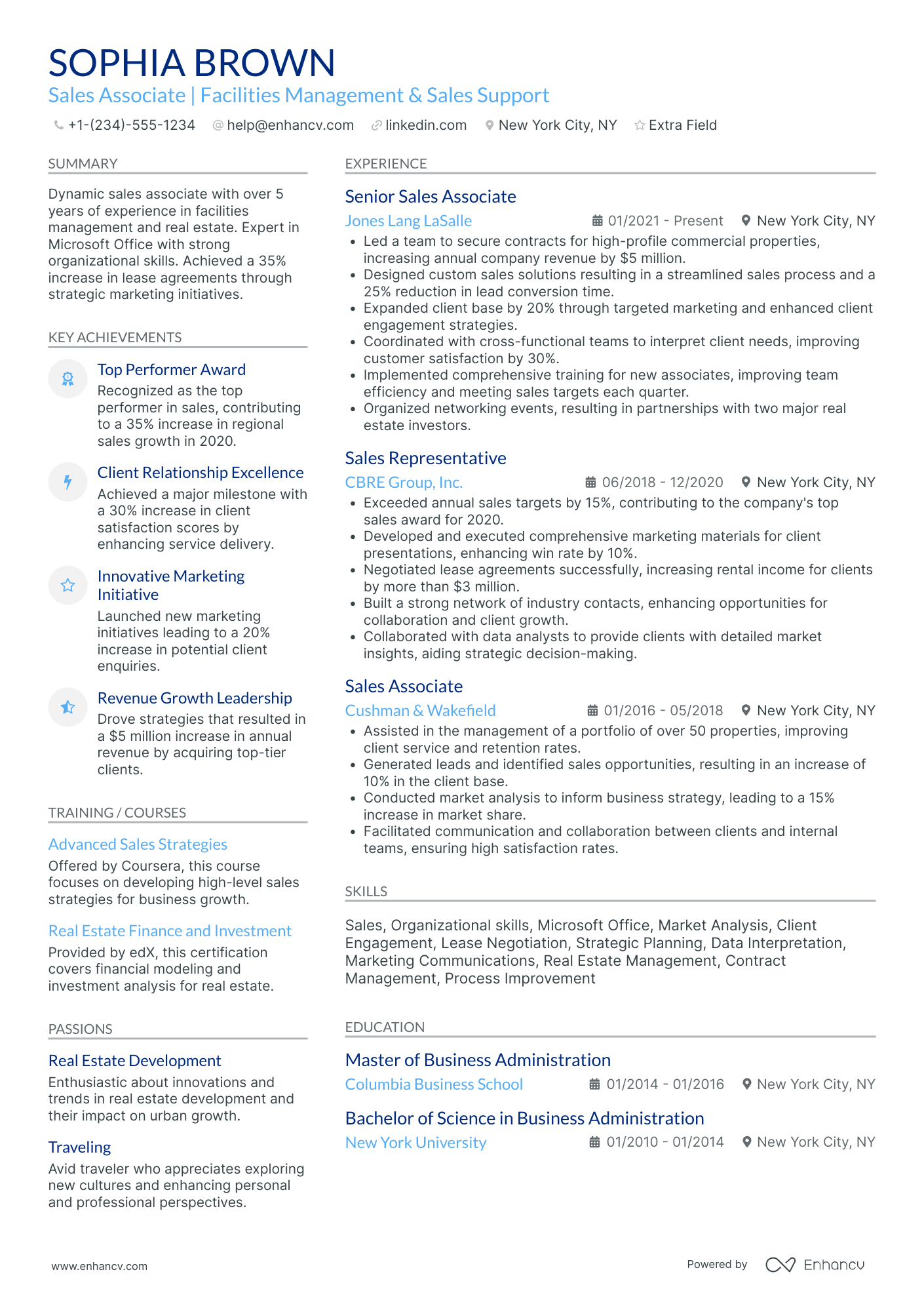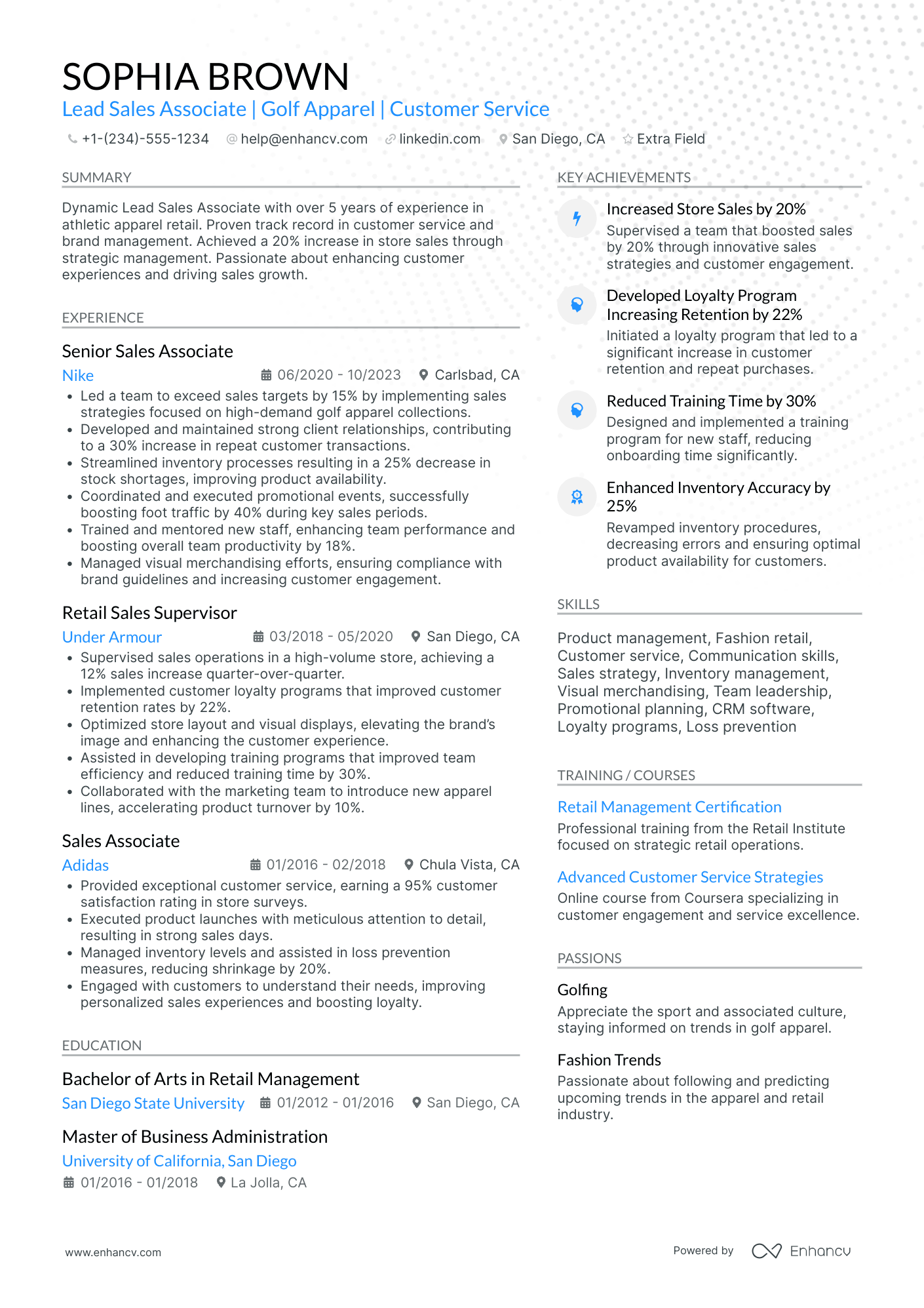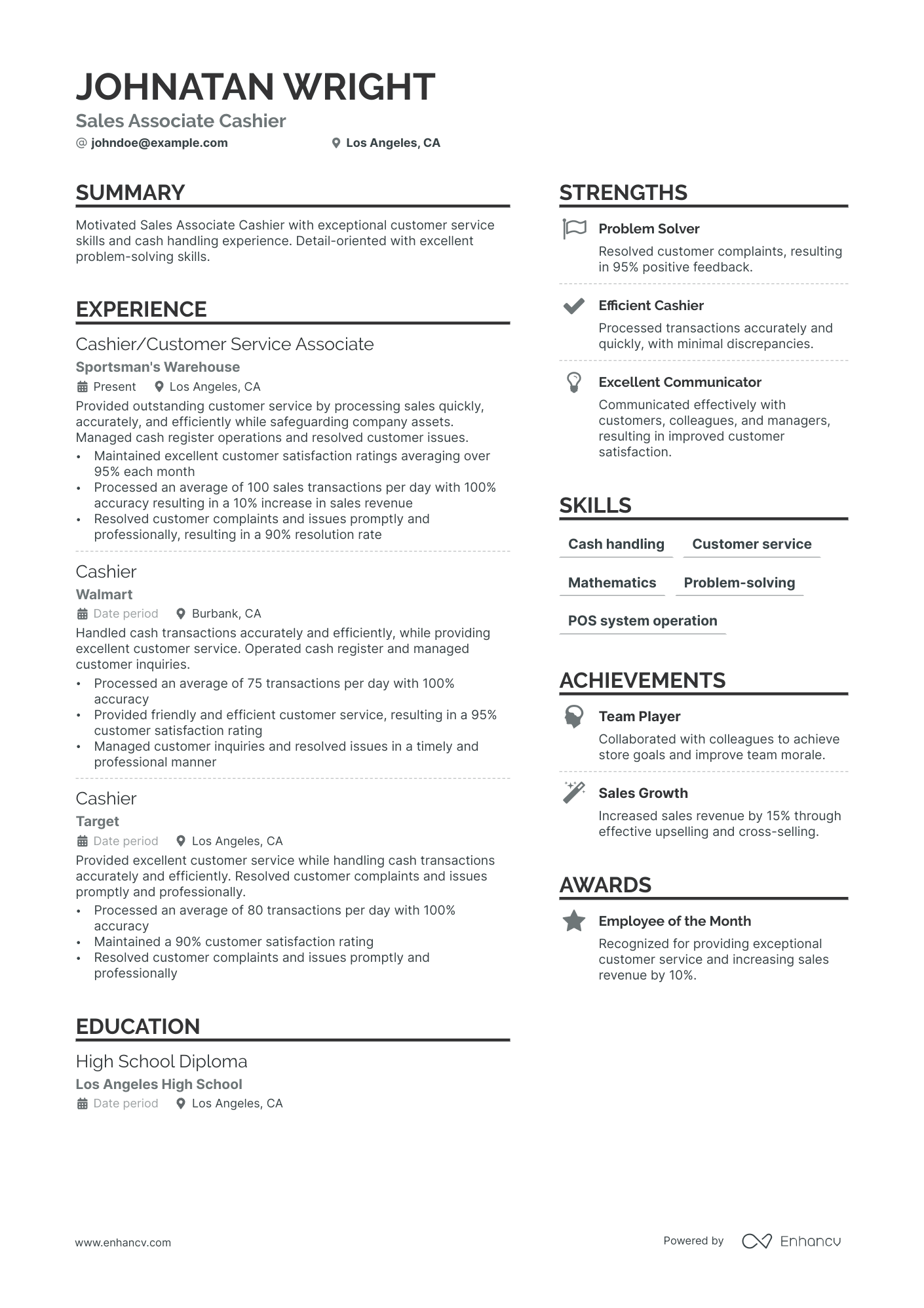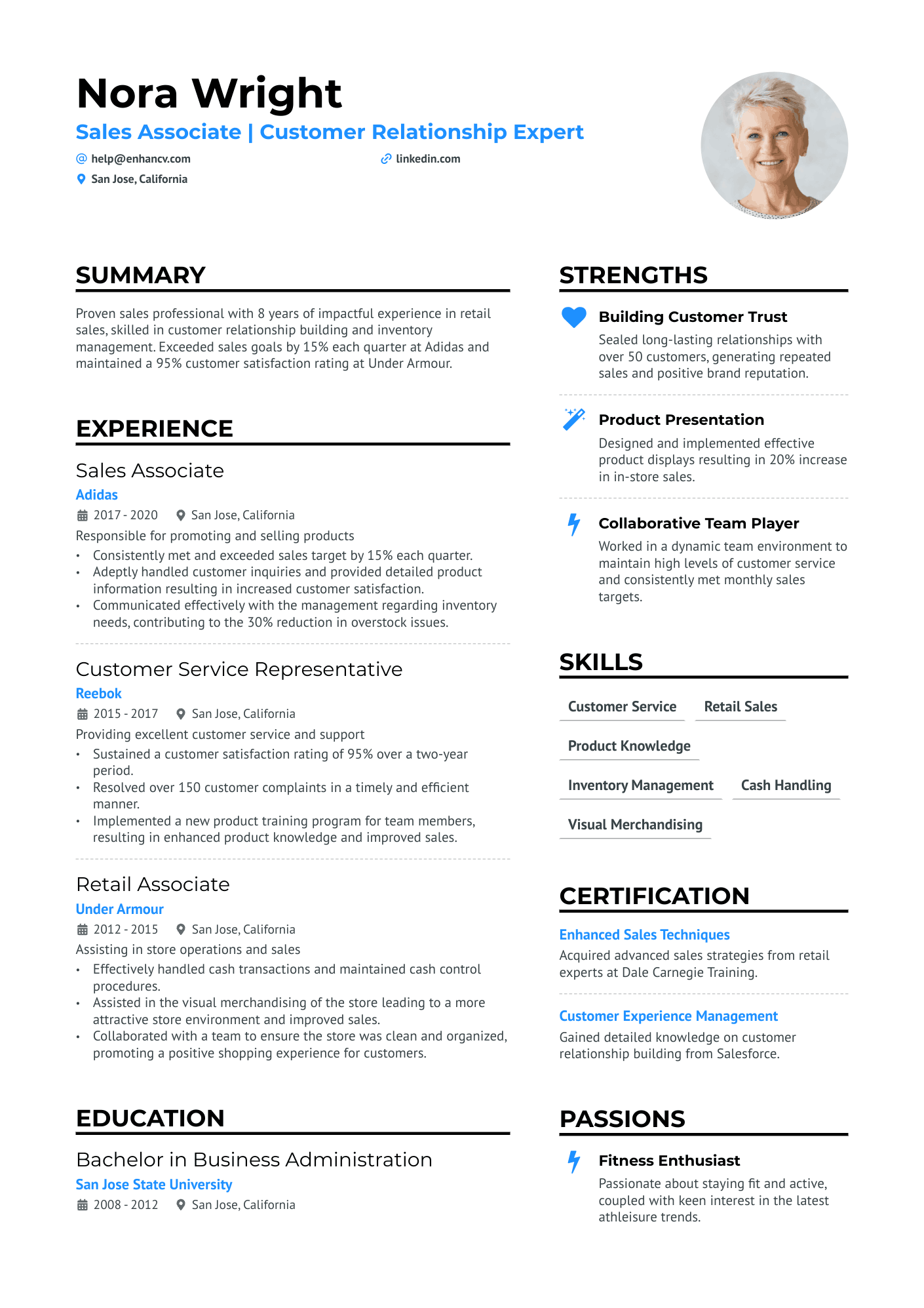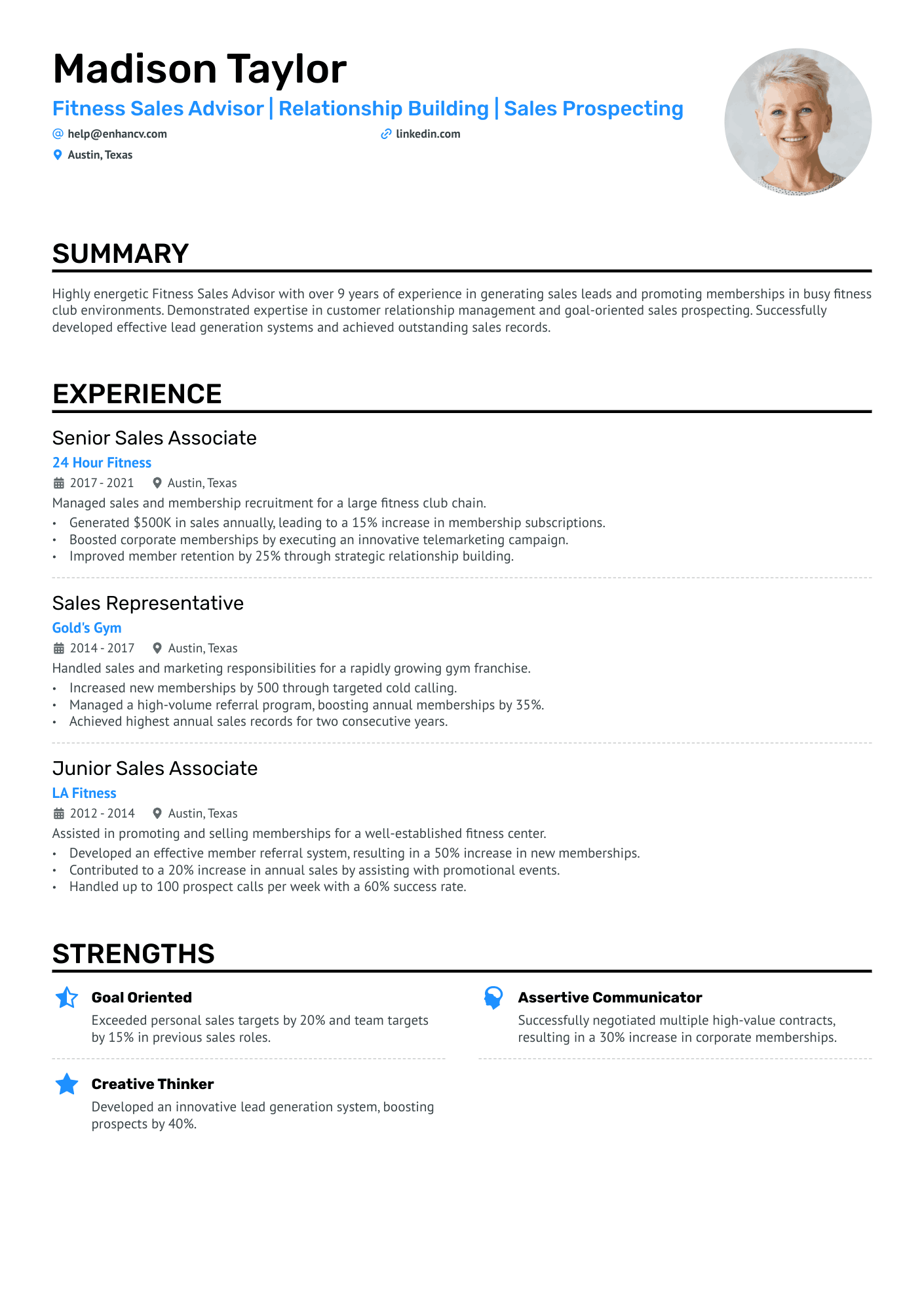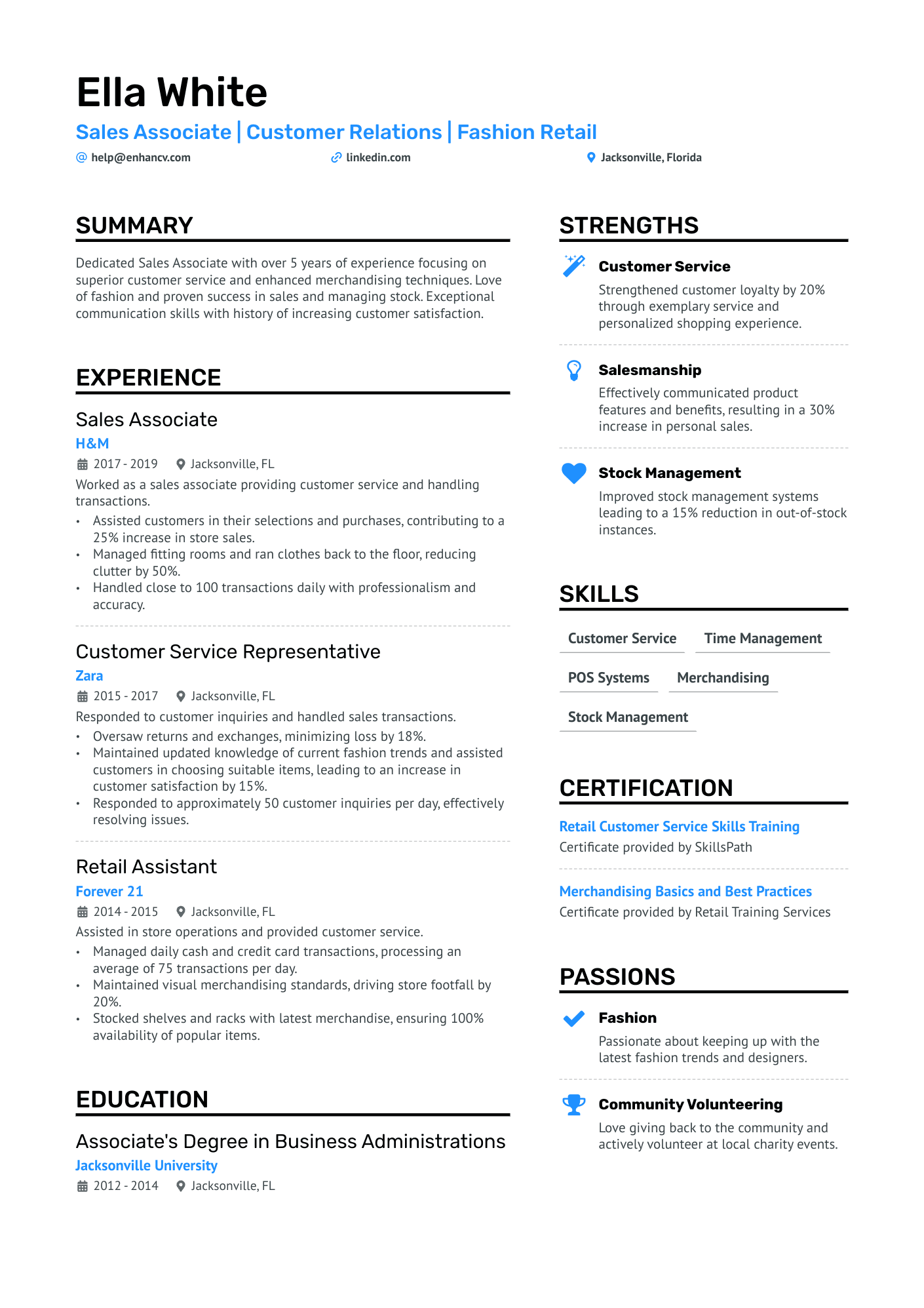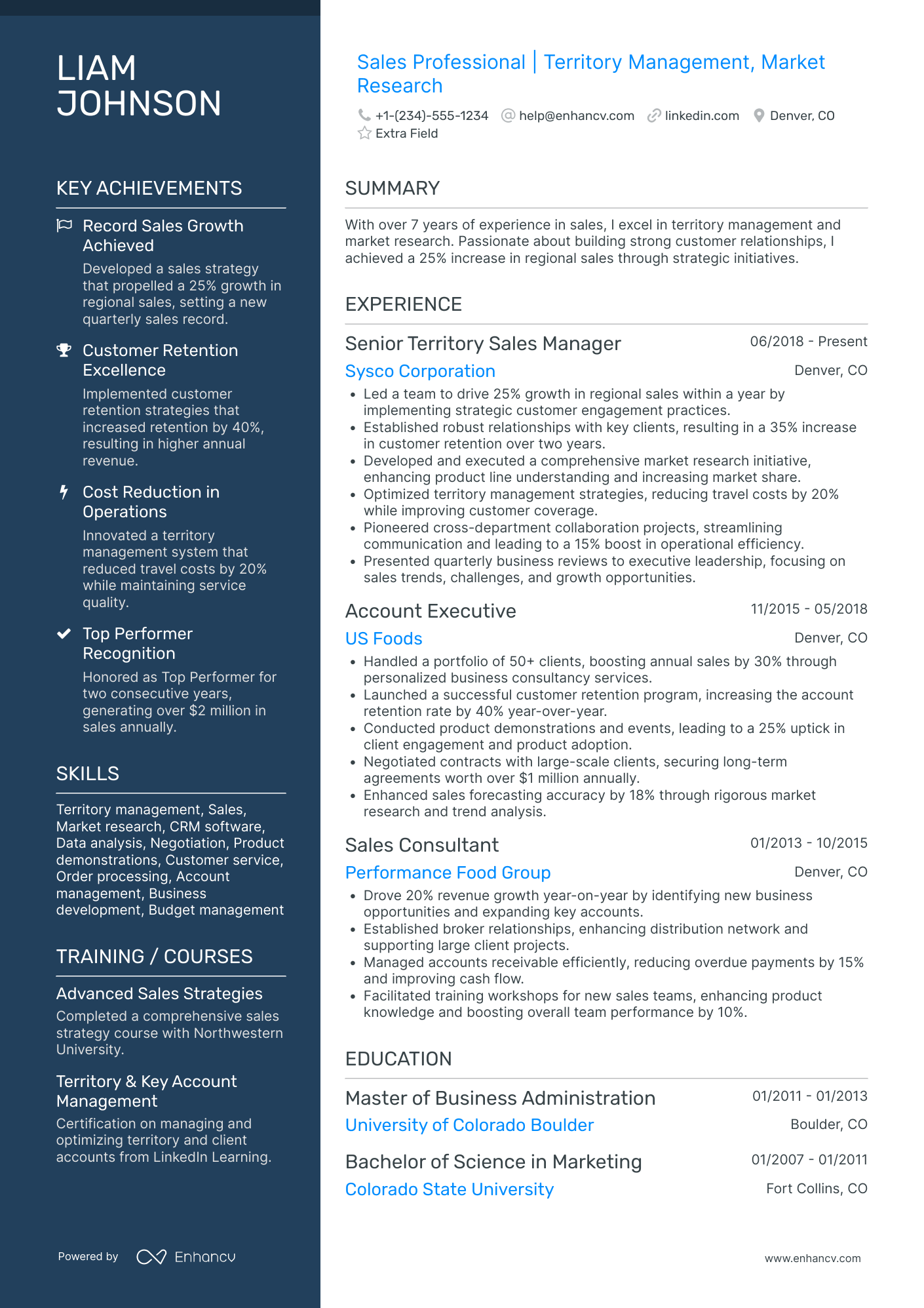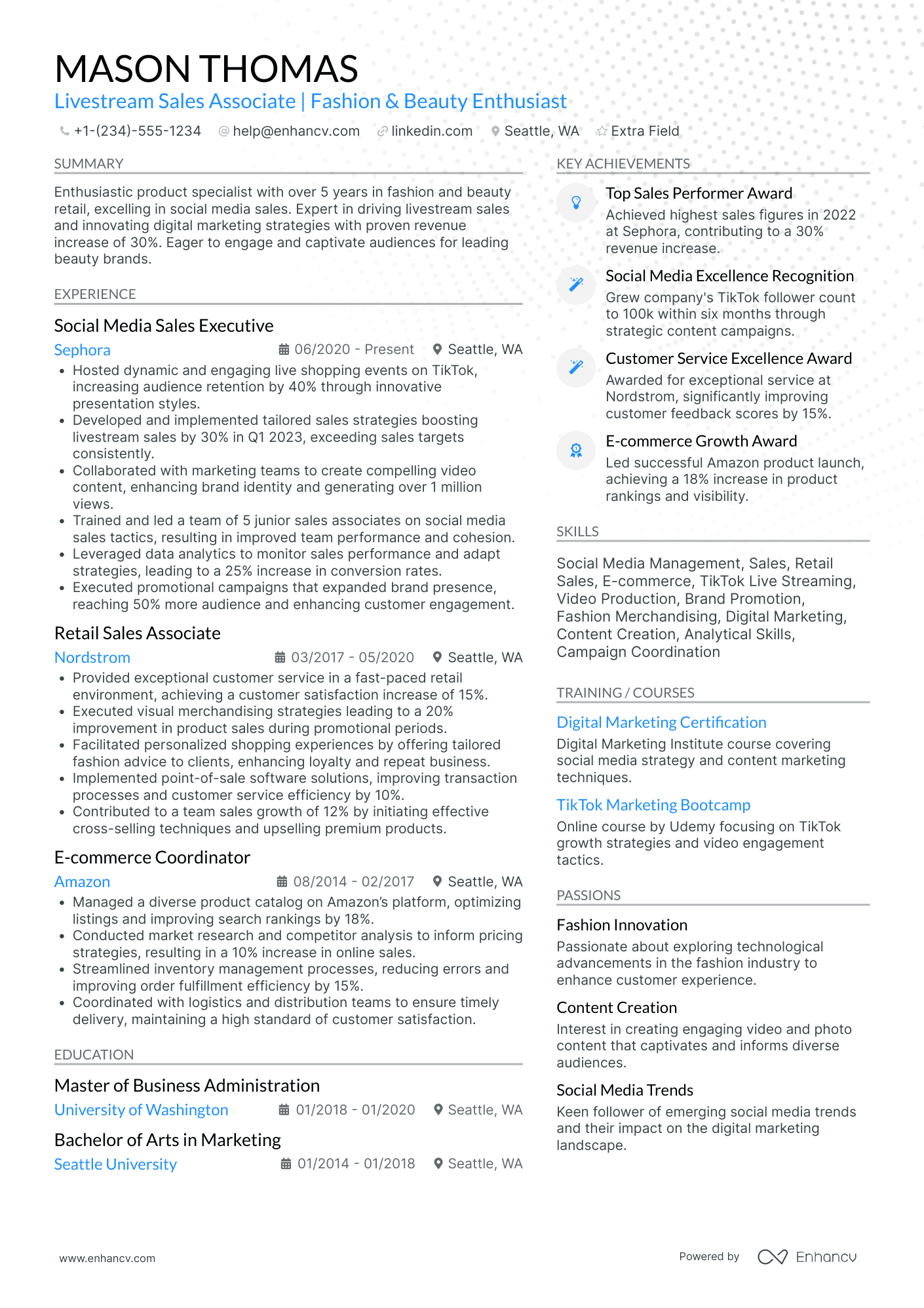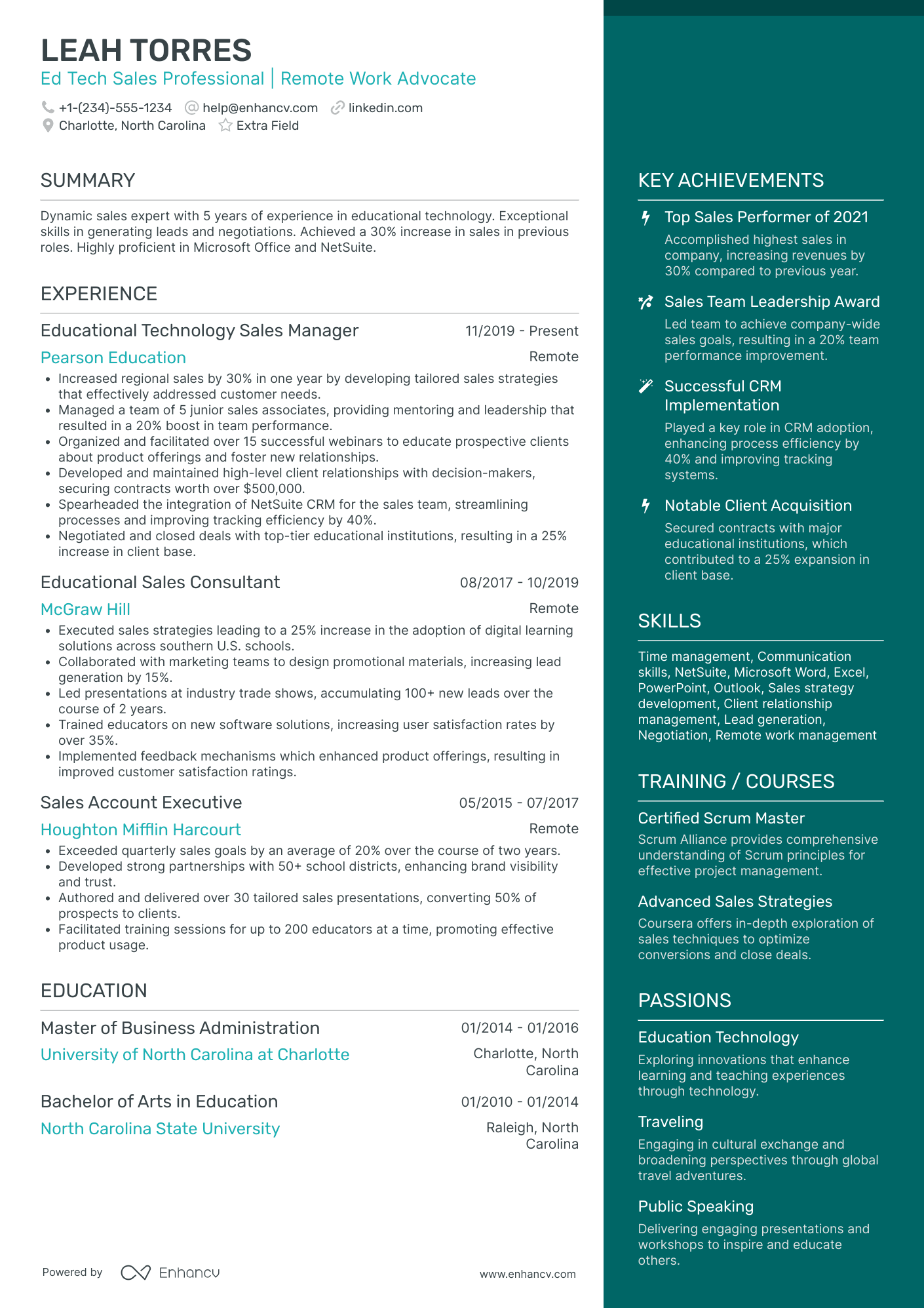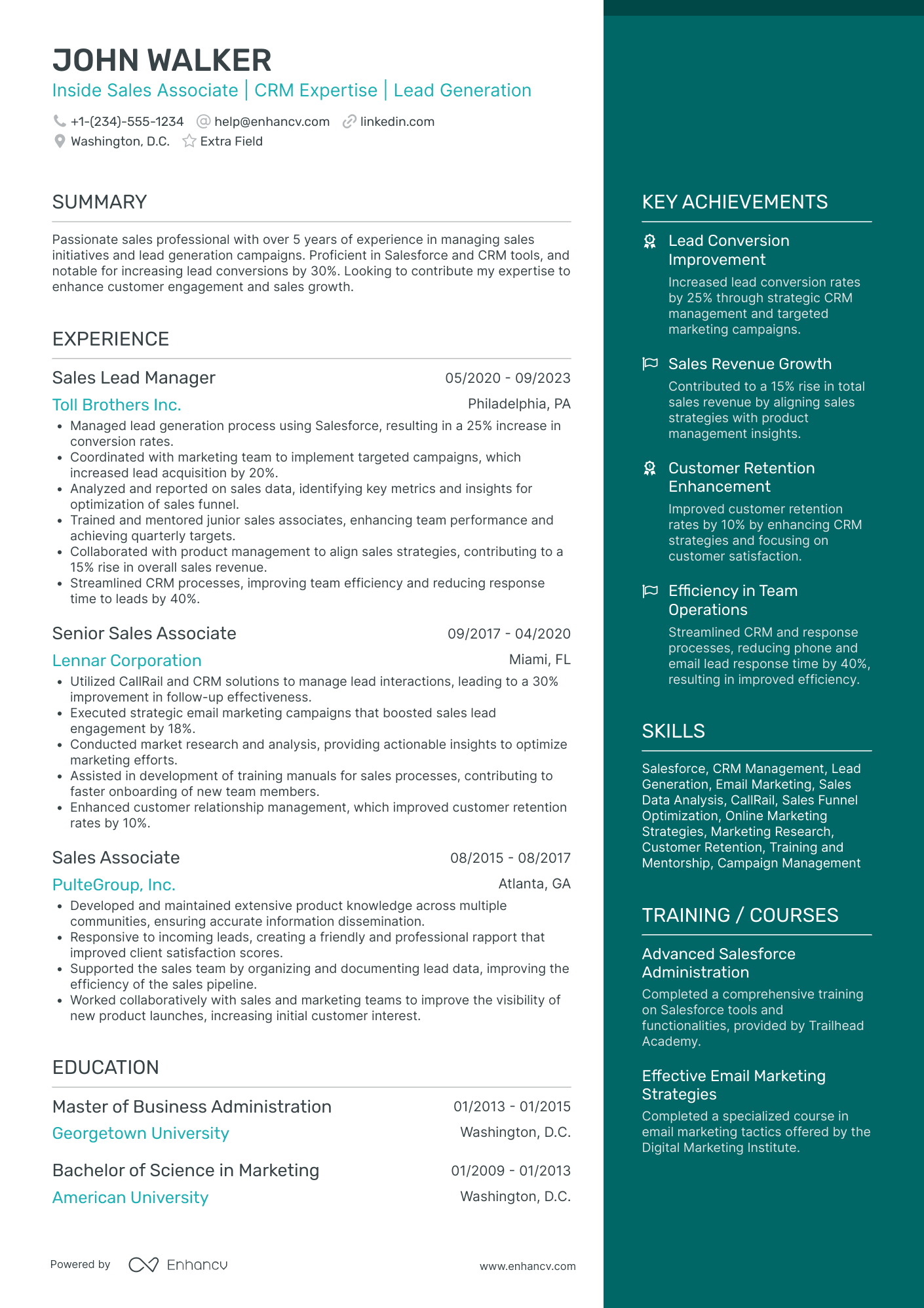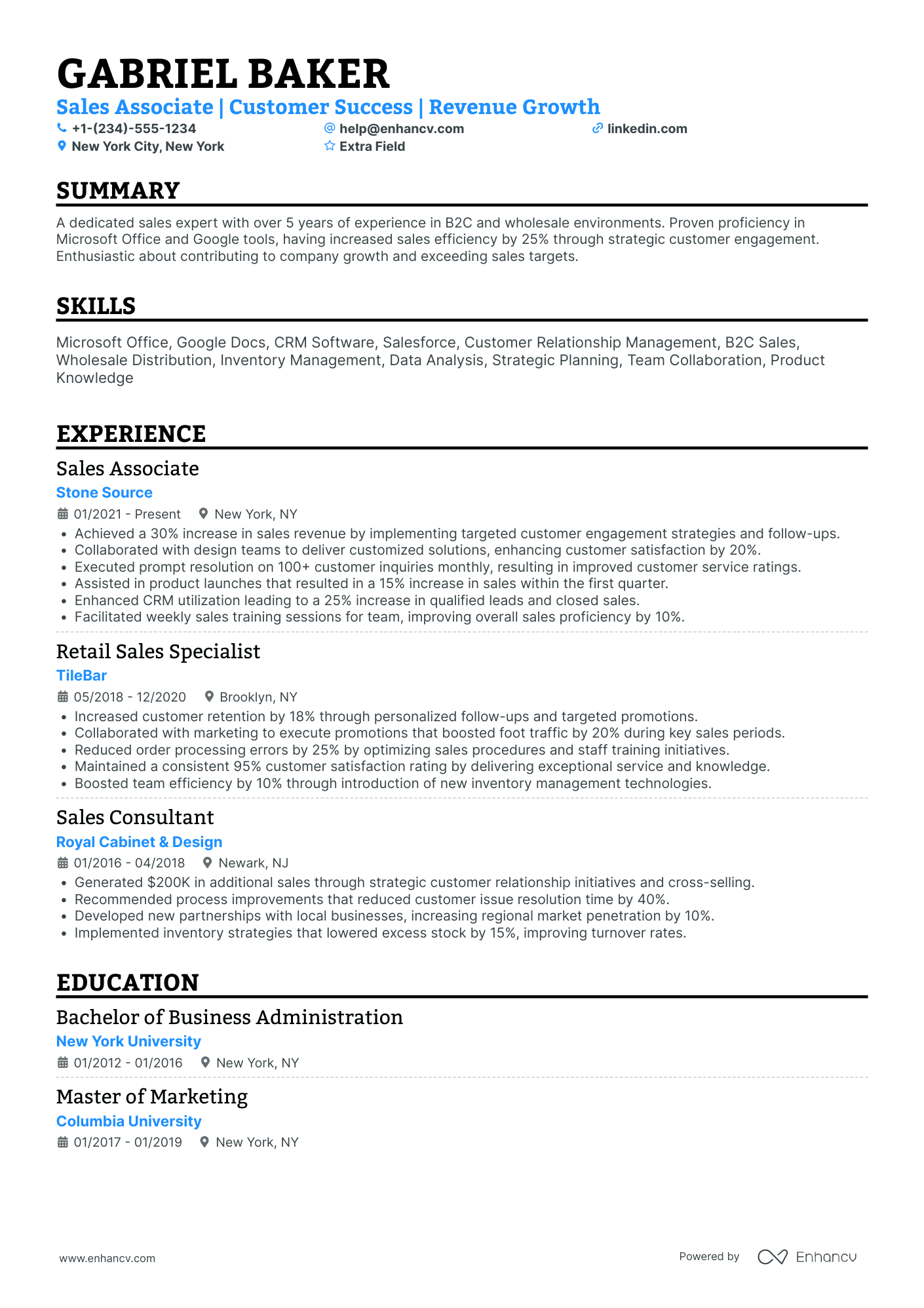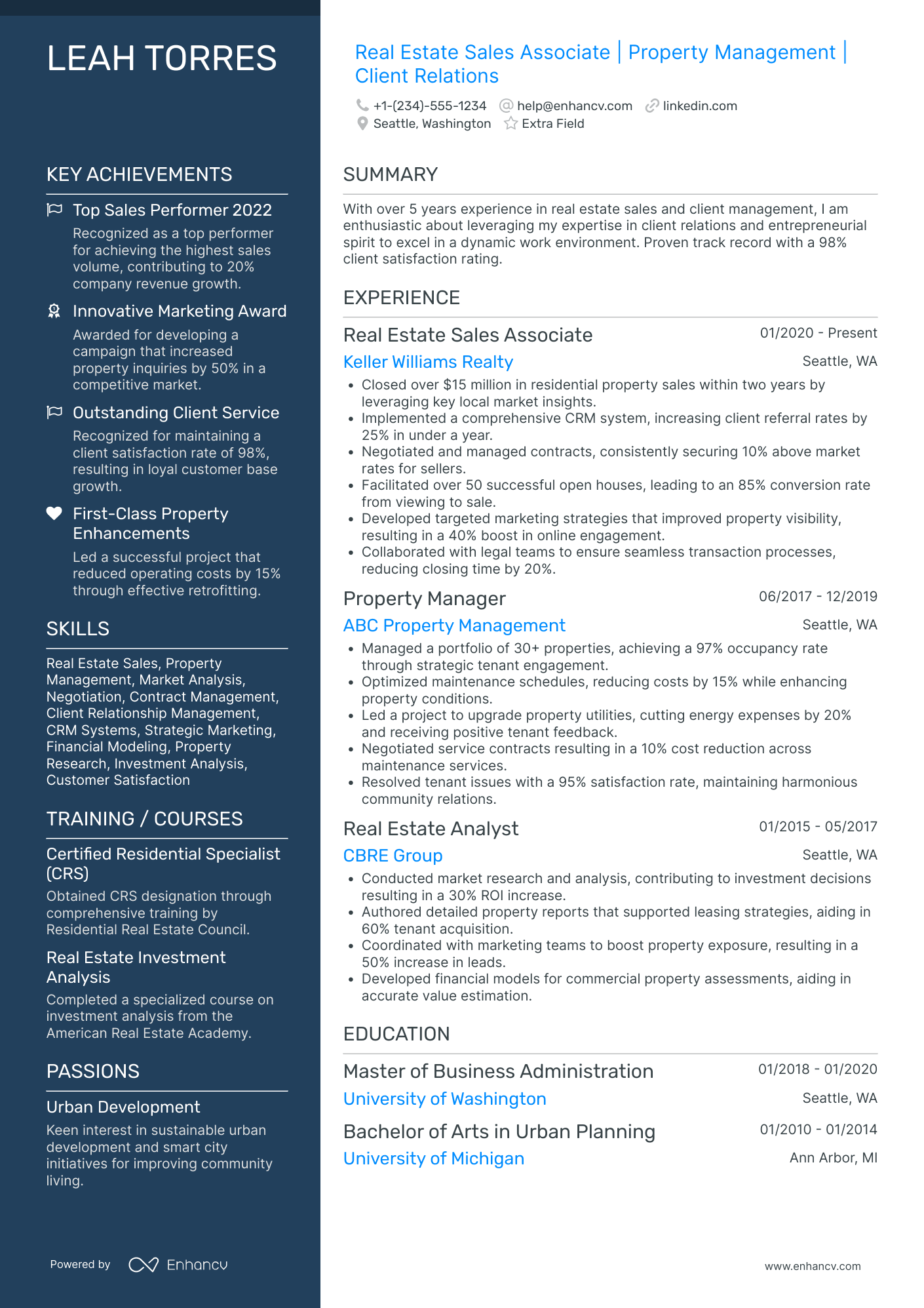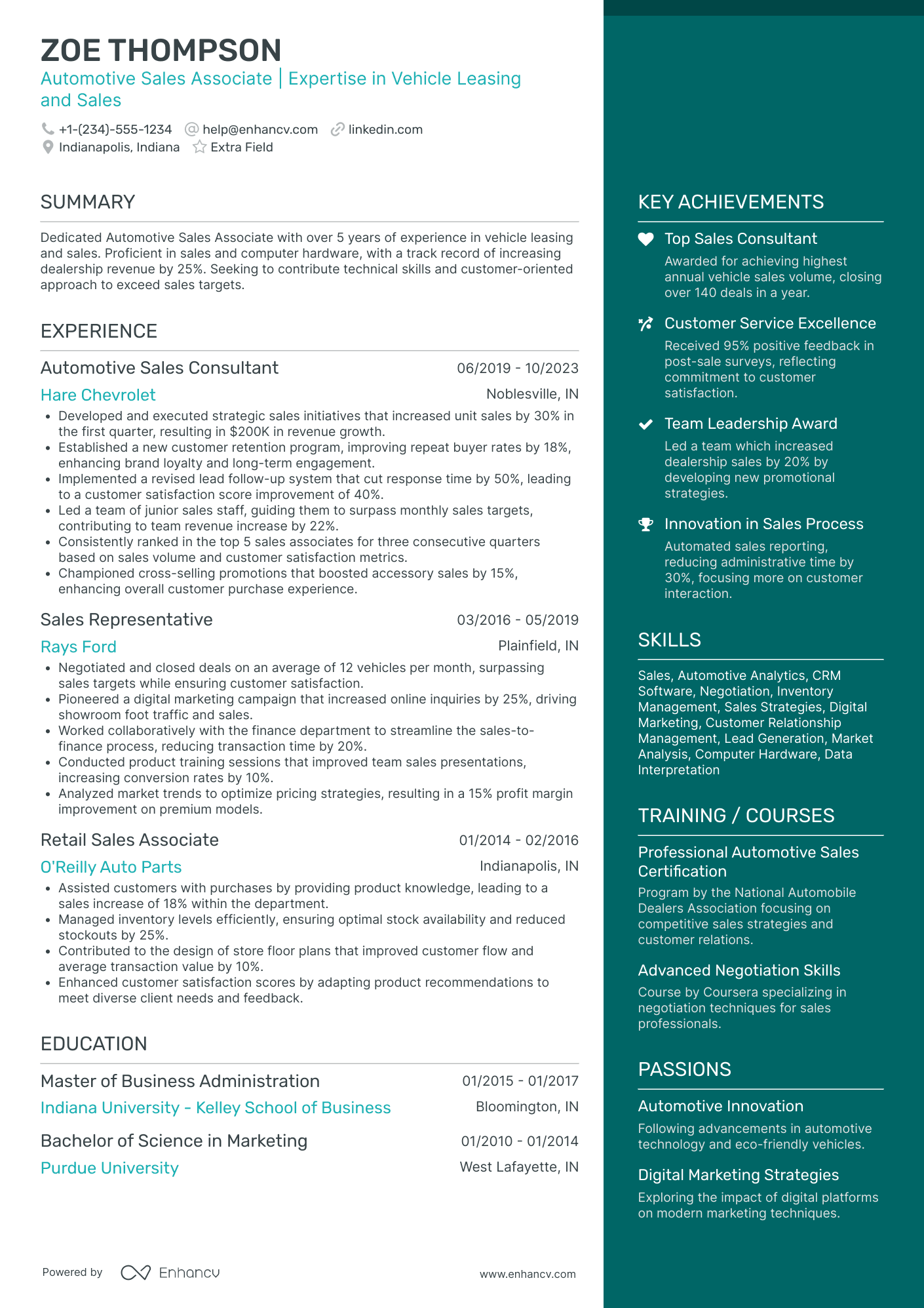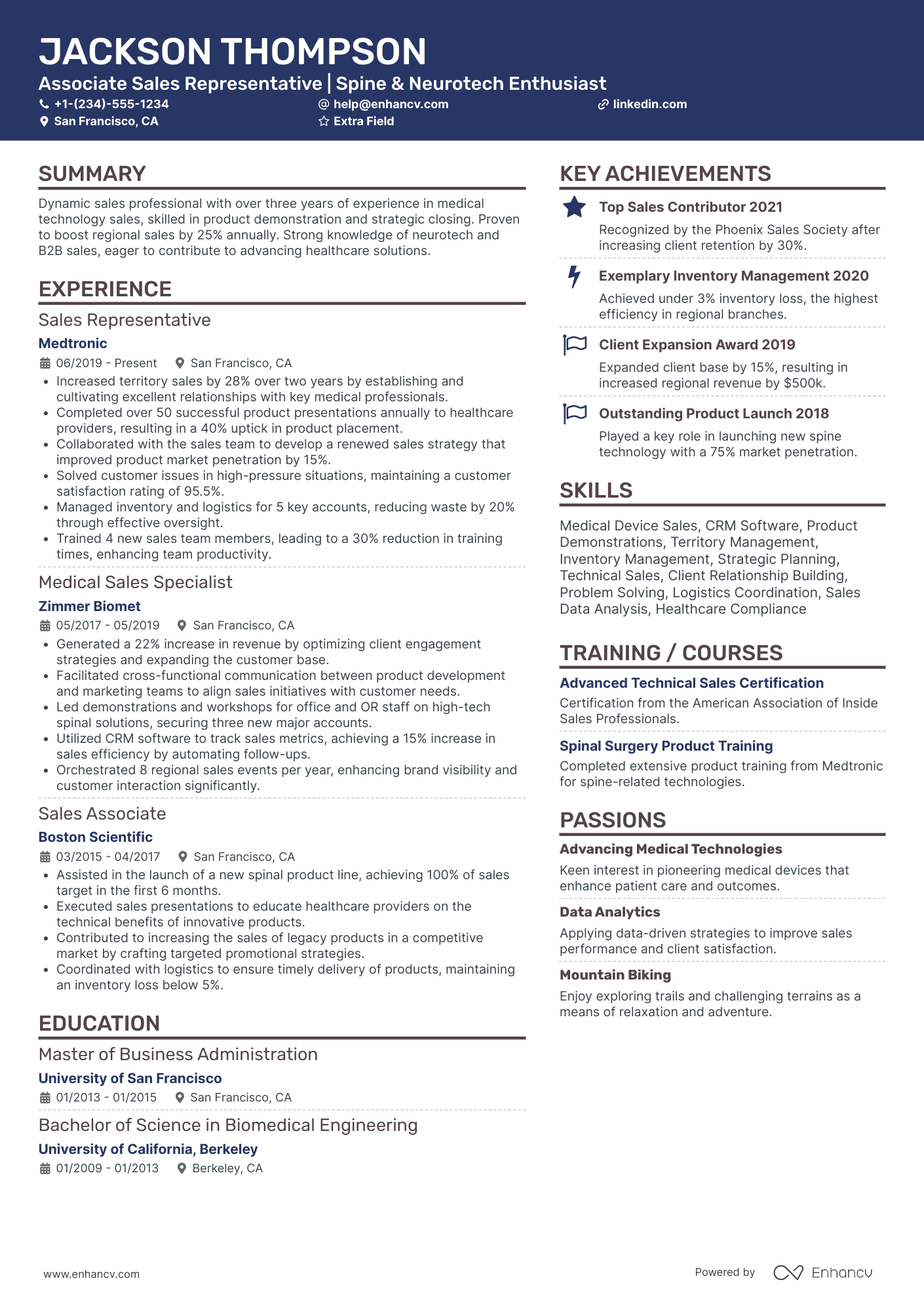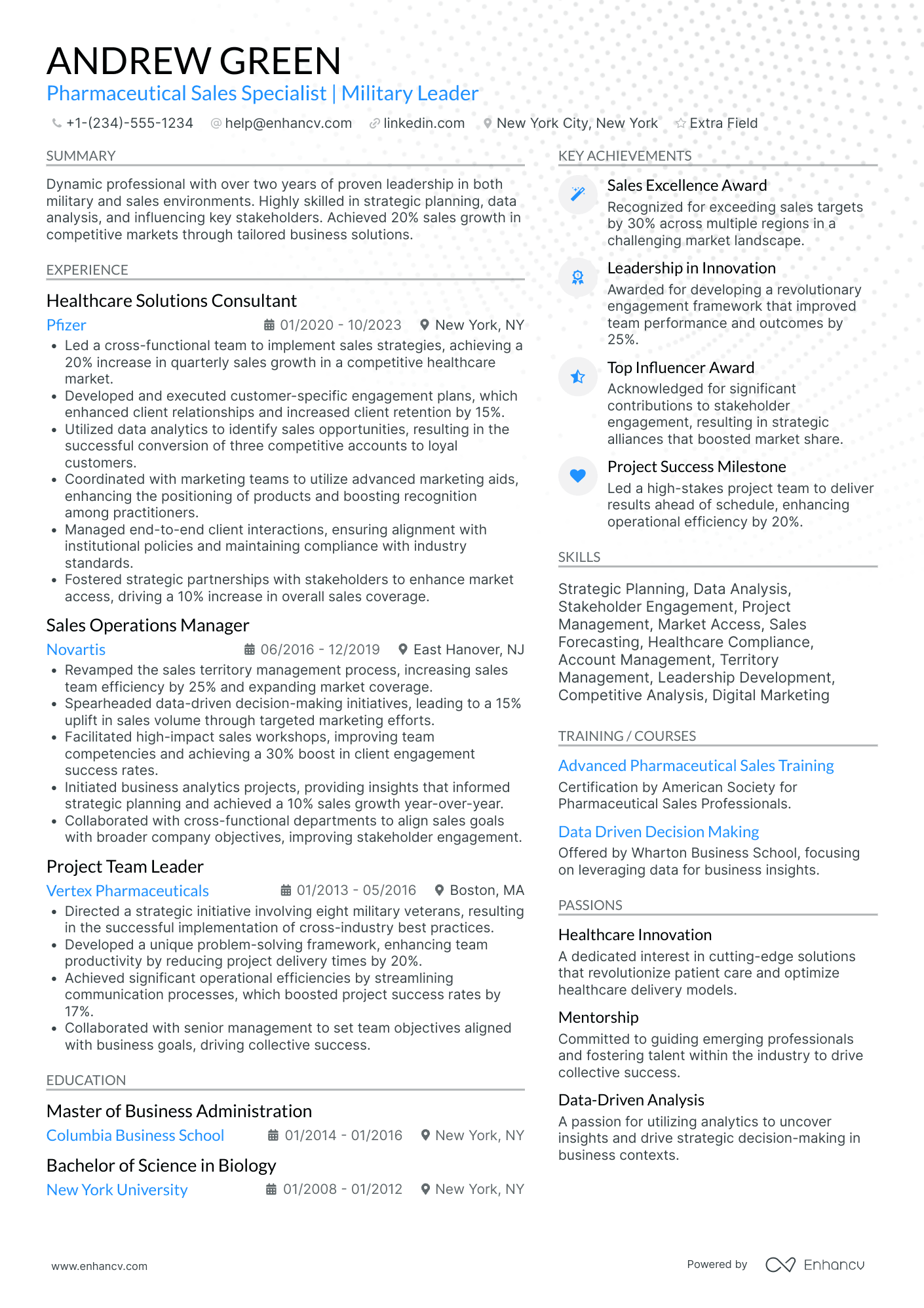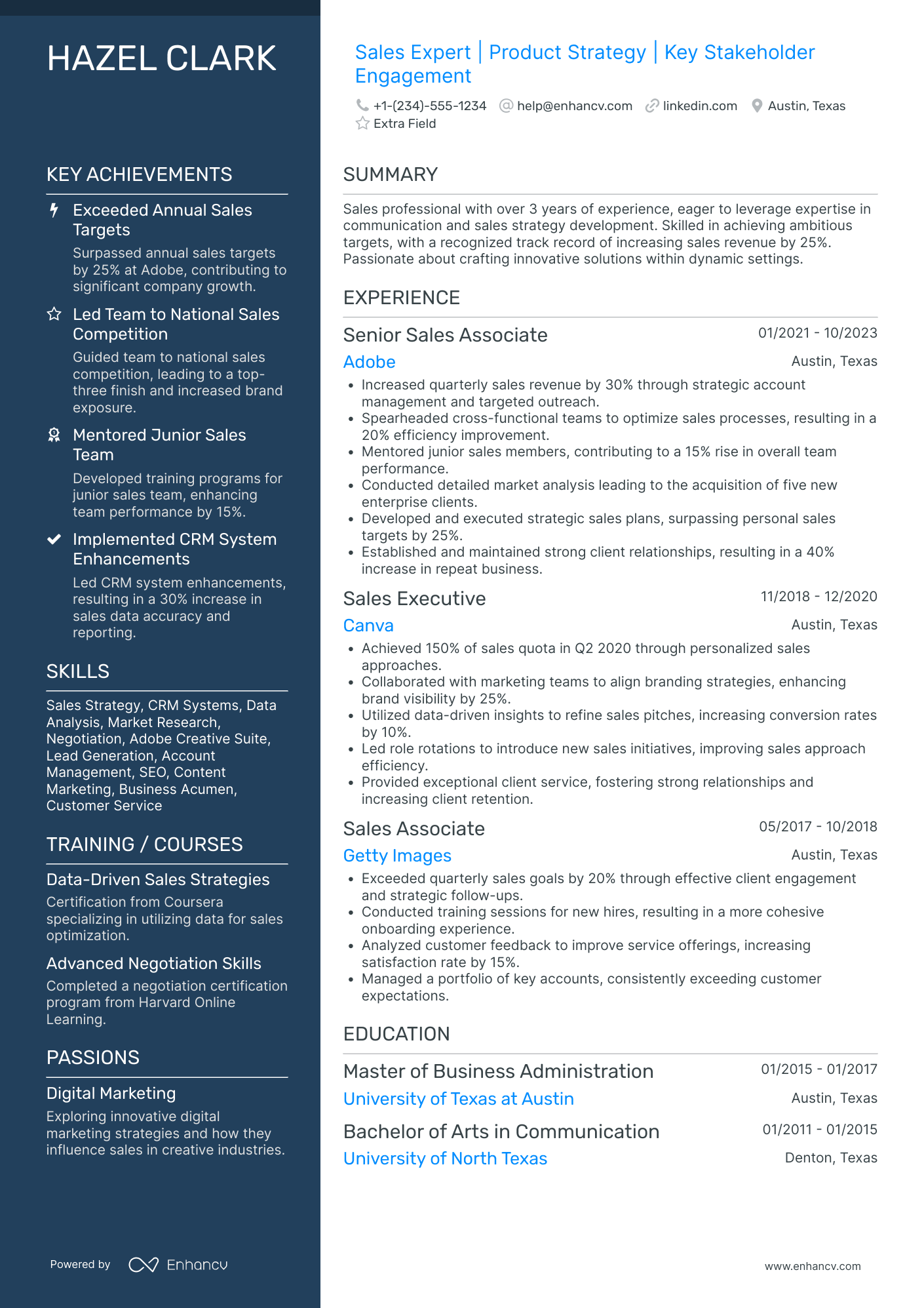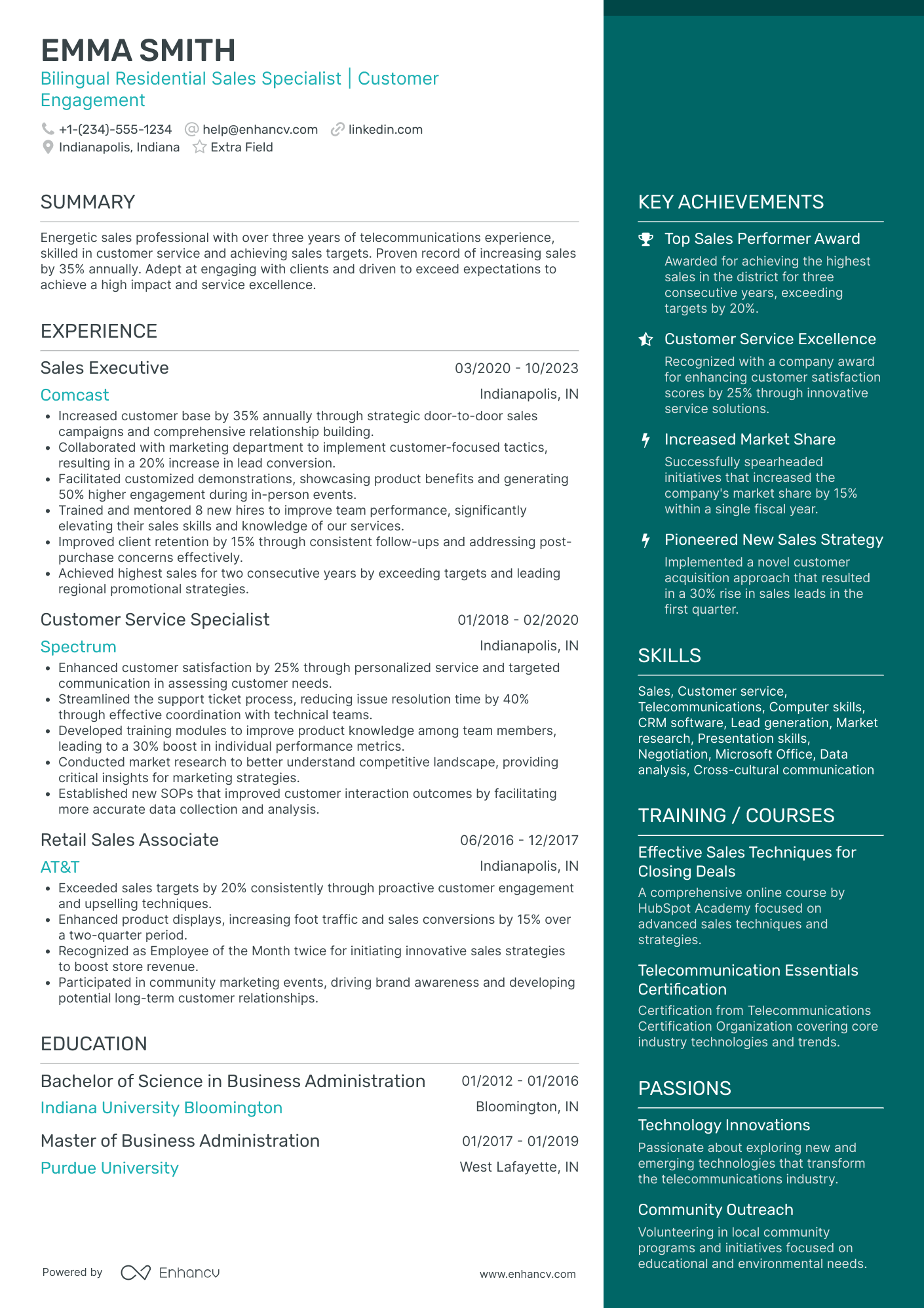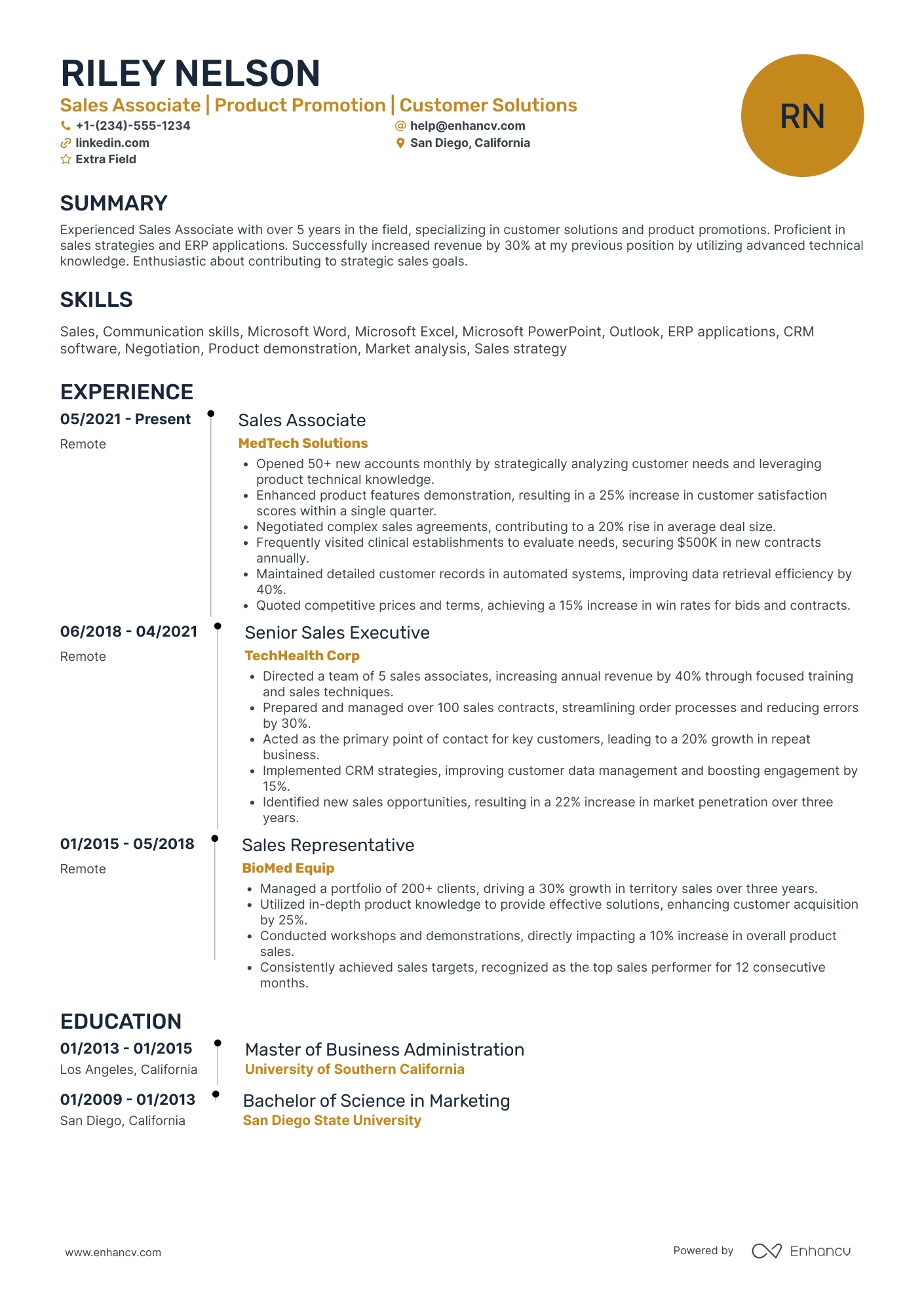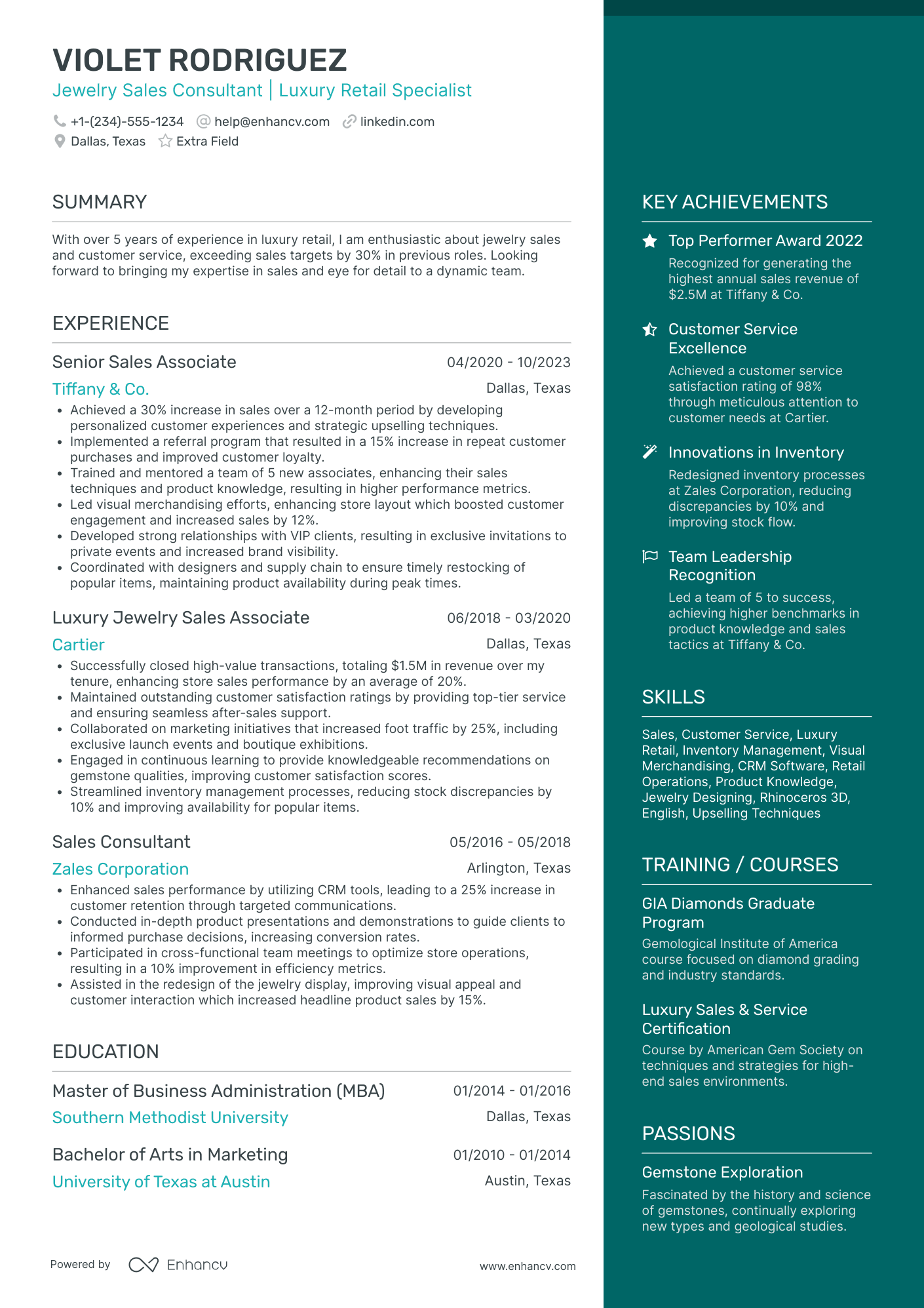Sales associates are often the face of the company and are the main driving force in getting customers to buy their product or service. If you’re interested in updating your resume for a new sales job, this guide will help you create a professional sales associate resume.
In this guide, we’ll highlight the common issues that sales associates face when updating their resume, like not quantifying sales metrics and forgetting to list relevant hard and soft skills. We’ll show you how to avoid these issues using real-world resume examples to illustrate how to avoid some of the common mistakes that sales associates make, such as:
- Highlighting relevant sales experience and knowledge of specific sales tools, like HubSpot and SalesForce, and e-commerce platforms, such as Amazon and eBay.
- Correctly balancing between quantifying sales and customer metrics that showcase your sales accomplishments.
- Demonstrating a wide range of technical knowledge, business savvy, and personal skills like negotiation and a passion for selling.
- Tailoring your resume to the job post’s listed requirements and focusing on describing experience in those areas.
We’ll also cover important topics, like the importance of highlighting memberships in sales networking groups and professional associations, as well as which job boards are more geared toward sales associates.
Before we begin, if you aren’t looking for a sales associate position, we have other related sales resume guides to help you find your dream sales job:
Sales Associate resume examples
By Experience
Senior Sales Associate
Junior Sales Associate
Experienced Sales Associate
Lead Sales Associate
By Role
Sales Associate Cashier
Retail Sales Associate
The Retail Sales Associate role is now heavily influenced by customer service dynamics in the consumer industry. When applying for such positions, make sure to call attention to any experience and skills you have in customer service strategies including suggestive selling, upselling, and handling customer complaints. Cite particular cases where you provided excellent customer service. Exhibit your understanding about the specific products or services you're offering, as this boosts the shopper's experience. Showcase how your personality traits such as patience, empathy, a positive attitude or persuasiveness have improved sales numbers, brought back customers, or enhanced customer satisfaction. Use a "trait-action-result" method to make your application results-focused. Don't forget to acknowledge any experience with retail technology like point-of-sale systems, customer relationship management software, or inventory control tools as their proper utilization can enhance productivity and efficacy.
Gym Sales Associate
Clothing Store Sales Associate
Outside Sales Associate
Fashion Sales Associate
Tech Sales Associate
Inside Sales Associate
B2C Sales Associate
Real Estate Sales Associate
Automotive Sales Associate
B2B Sales Associate
Pharmaceutical Sales Associate
Direct Sales Associate
Telecom Sales Associate
Digital Sales Associate
Luxury Sales Associate
The first step in building an attention-grabbing resume is to format it using the industry standard for all resumes.
How to Format a Sales Associate Resume
Format has always been important when it comes to building a resume for any type of job. Why?
The main sections of a resume include a header, professional summary, work experience, education, and skills section. If you had to search through an average of 250 resumes for a single job and each of those resumes was formatted differently, it would be a monumental task to accurately find a single qualified candidate.
If you want an easier way to build your resume, use the Enhancv resume builder to get started.
The standard resume format has the same settings as any new document, which include:
- One-inch margins on all sides.
- Line-spacing set to single space.
- A serif or sans-serif font type set between 10-12 points.
- A plain white background with a black font color.
How many pages should your resume be? The standard resume length is two pages. Any more than that, and most recruiters or HR staff will stop reading. If you haven’t impressed them in two pages, more won’t help. You want to put as much information on a single page as possible, which is why more experienced sales associates choose a two-column layout.
When you add your relevant work experience, there is a specific format that you need to follow. The one you choose is based on how much experience you have. The most popular choices of resume formats include:
- Chronological: For more experienced sales associates with more than five years of relevant work experience.
- Reverse-chronological: Ideal for junior sales associates with 1-5 years of experience.
- Functional skills-based: For sales associates with no sales experience.
- Hybrid: Best for beginning sales associates with 1-3 years of experience or who have gaps in their work experience.
The layout of your resume is more than just a personal preference. If you have 5-10+ years of experience in sales, a two-column layout will serve you better than a single-column layout. You can put more information on a single page, making it easier to include all of your relevant details with less scrolling.
When you are ready to submit your resume, send it as a PDF document (.pdf). This is the standard document type that recruiters prefer, as it maintains the look and feel of your resume, no matter what operating system or screen size they’re using.
Consider your target market – resumes in Canada, for example, follow different layout conventions.
Is your resume good enough?
Drop your resume here or choose a file. PDF & DOCX only. Max 2MB file size.
If you have a sales associate resume ready to go, run it through our resume checker for an in-depth analysis and tips on improving it.
Let’s take a minute to review the top sections of your resume and the type of information recruiters and HR managers like to see from their new sales associate recruits.
The top sections on a sales associate resume:
- Contact information: Include your full name, phone, professional email address, and a link to a professional social media account.
- Resume summary/objective: A tailored section that includes past work experience and personal sales accomplishments or career objectives.
- Related work experience: A detailed list of past work experience that includes past sales associate work or other related positions.
- Education and sales certifications: Include details of a high school diploma, GED, or college degree and any sales certifications.
- Skills sections: A list of business, technical, and personal skills that are essential for any sales associate.
Here’s a Sample of What You Should Be Including on Your Resume:
What recruiters want to see on your resume:
- Proven sales experience: Your resume needs to include sales experience that demonstrates you can sell anything to anyone.
- Strong communication skills: Being able to communicate with all types of people and get them to engage is essential for selling and meeting quotas.
- Product knowledge: In order to sell a product or service, you need intimate knowledge of how it works and how it can better the customer's life.
- Customer service skills: Difficult customers are part of the job, and you need to demonstrate conflict-resolution and negotiation skills so recruiters know you can handle any type of sales scenario.
- Meeting sales targets: Recruiters love to see resumes that quantify sales metrics and that indicate you’re meeting or exceeding sales goals on a regular basis.
When you add your work experience and education, you’ll list them in reverse chronological order. This allows anyone reading your resume to see your most recent work and education.
Now, you’re ready to start adding relevant details to your resume.
How to Write Your Sales Associate Resume Experience
The resume experience section is where you will include your relevant professional sales experience.
For each job entry, you want to include the following information:
- Job title
- Name of the organization
- Industry type or company description
- Dates of employment
- 4-8 concise bullet points listing your accomplishments
To stay within that two-page limit, only include up to 3 relevant jobs. That means you can leave off that summer job as a lifeguard unless you were responsible for selling swimsuits or safety equipment.
The goal here is to create a targeted resume that details the key job requirements and duties that are listed in the job post. Later on, we’ll use a current sales associate job post to show you how to do this.
I always say seeing is believing, so let’s look at a real-world sales associate resume experience example for some tips on what to do and what not to do in this section:
- •Formulated and executed compelling seasonal sales promotions
- •Proactively interact with customers to recommend products that best suit their tastes, interests, and needs.
- •Worked collaboratively with a team of sales associates to devise strategic sales solutions to meet sales targets.
- •Studied all product information to help customers make an informed sales decision.
In this example, we get a vague retelling of the duties they performed without providing any specific details.
As a recruiter, this type of resume experience does little to make an impression and leaves more questions than answers. It fails to answer the basic question this section must answer: How did you use your skills and experience to interact with customers and generate new sales?
Let’s try to see if we can edit this and get the answers to our questions:
- •Formulated and executed compelling seasonal sales promotions, resulting in over 30% increases in in-store sales for 5 consecutive months in 2022 and 6 consecutive months in 2023.
- •Proactively interacted with customers to recommend products that best suit their tastes, interests, and needs, resulting in an average of 98% in customer satisfaction scores.
- •Worked collaboratively with a team of 8 other sales associates to devise strategic sales solutions to achieve and exceed the department's monthly, quarterly, and yearly sales goals by an average of 20-30%.
- •Preserved up-to-date knowledge and information about the latest products or upcoming releases to effectively assist customers with various product-related concerns by providing accurate details.
Does this example answer our questions? Impressively so. We now get a better picture of this person’s sales abilities and how passionate they are to exceed their sales quotas.
This example does a great job of:
- Detailing their efforts in improving sales promotions, which led to a significant increase in in-store sales within a specified time frame.
- Highlights their ability to work well within a team environment to develop new sales strategies to continue to meet and exceed sales targets.
- Showcases their interpersonal skills and ability to tailor their sales pitch to the customer’s personal interests.
Next, we’ll show you which metrics recruiters are most interested in seeing and how you can quantify your sales achievements.
How to quantify impact on your resume
Your resume is the first impression recruiters and hiring managers will get of you, and you want to be sure to put your best foot forward. You want to detail your work experience so that it comes across as confident, like a firm handshake that says, “I am the right person for the job.”
Using numbers and percentages to detail your past work experience will give you a competitive edge over other job candidates who don’t quantify their achievements.
Which sales metrics should you focus on? Here are the top metrics that recruiters want to see from potential sales associates:
- Incorporate sales numbers: “Increased loyalty and word-of-mouth advertising by assembling gift baskets for customers based on a 71% discount, generating $3,200+ in monthly revenue during the holiday season.”
- Percentage of sales goals achieved: “Achieved an average of 140% of sales goals for three consecutive months.”
- Number of daily customer interactions: “Assisted an average of 40 customers per day in finding or selecting items and providing recommendations, which have generated a total of $8,000 in additional revenue.”
- Number of customer retention: “Aided Spanish-speaking customers, increasing repeat and loyalty customers by 30%.”
- Number of new customers acquired: “Developed and implemented a sales strategy that resulted in a 25% increase in new customer acquisition within the first quarter.”
- Rankings within a sales team: “Performed strategic upselling and cross-selling of women’s apparel and other sports products based on customer tastes and interests, resulting in ranking as the leading sales associate for 8 months in a row.”
- Reductions in customer complaints: “Reviewed existing customer retention programs and updated callback and email procedures, which reduced customer complaints by 49%.”
- Number of products/services mastered: “Detailed knowledge of over 50 nutrition supplements, including their benefits, side effects, and restrictions.”
You’ll need to study the job post to know which specific metrics to focus on. If it talks about increasing the amount of walk-in traffic, you can focus on your efforts to interact with customers and the amount of sales that you generated from in-person sales. You could also quantify any sales strategies geared toward increasing repeat customers.
How do I write a sales associate resume with no experience
For those of you looking for your first sales associate job, now is the time to jump head-first into the pool of First-Timers. Don’t worry—even the most successful sales associate once stood nervously where you are, tentatively dipping their toes into new waters.
It isn’t about the type of job you had, but rather about the duties you had. For instance, a hostess relies on excellent interpersonal skills and a friendly demeanor to greet customers and assist them with whatever they need. These skills are essential for a sales associate and should be highlighted in the resume experience section.
Other types of related experience that sales associates need to include:
- Experience in customer service in retail, hospitality, call centers, or other service-oriented jobs with daily customer interaction.
- Demonstrating a product or service to a customer that includes discerning technical information so that every customer can understand.
- Practical experience through college internships and volunteer work.
- A firm understanding of CRM software, point-of-sale (POS) systems, and other sales-related software, like Microsoft Dynamics 365 Sales and HubSpot Sales Hub.
If you can, tailor your resume experience section to show a clear career progression toward a sales associate, like so:
One of the best ways to get noticed over the hundreds of other applicants is by creating a targeted resume that focuses on the keywords and metrics listed in the job post.
Tailoring your resume to the job post
Creating a tailored resume takes a little bit of work but will be well worth the effort when you start getting more responses from recruiters. If you don’t include keywords or phrases from the job post, you might as well try selling ice cream to someone who’s lactose intolerant—it’s just not a good idea.
Take a look at the job responsibilities for this recent job post for a small retail outlet:
Responsibilities:
- Greet customers warmly upon arrival or through phone calls.
- Provide product education and assistance to customers in their decision-making process.
- Complete the sale, order, and payment process with customers.
- Load and unload products from delivery and customer vehicles.
- Stock shelves.
- Perform janitorial duties, including light cleaning of customer areas, bathrooms, office, and storage spaces.
There are several keywords that you can focus on here:
- Greeting customers warmly: “Welcomed incoming customers and guided them toward the appropriate aisle or provided additional product information when asked.”
- Provide product education: “Studied all new products and worked with sales team to ensure they’re familiar with its uses and benefits.”
- Complete sales, order, and payment process: “Processed customer sales using OpSuite POS desktop and mobile POS devices while processing payments through Ingenico and Square payment processing machines.”
- Load and unload products/Stock shelves: “Maintained the store by sweeping, vacuuming, and putting over 300+ products in their precise locations with zero errors.”
- Perform janitorial duties: “Cleaned storefront at the end of shift and performed light cleaning duties during working hours.”
Next, we’ll talk about how to add your technical, business, and personal skills to round out your work experience.
How to List Your Hard and Soft Skills on Your Resume
Professional sales associates rely on a number of unique skills to do their jobs well. These include technical knowledge of software and equipment, negotiating skills, and other skills like being resilient and able to interact with all types of people.
What are hard and soft skills? Hard skills cover business and technical skills, such as knowledge and experience with SalesForce, point-of-sale systems, and specific product or service knowledge. You learn these skills through education, internships, and real-world work experience.
Soft skills describe more personal skills that you learn through everyday life experiences and interactions with friends, family, and peers. They include essential sales skills that allow you to interact with your customers on a more personal level and persuade them to purchase the product or service.
These skills allow you to better understand a customer's needs and help them choose the right product or service.
Which skills should you put in your resume skills section? Here’s a list of the hard and soft skills that make for an effective sales associate:
Best hard skills for your sales associate resume
- Product knowledge
- Point of Sale (POS) software
- Customer relationship management (CRM) software
- Sales pitching
- Market research
- Inventory management
- Merchandise techniques
- E-commerce platforms
- Data analysis
- Sales reporting
- Microsoft Office suite
- Technical product features
- Cash handling
- Budgeting
- Sales forecasting
- Pricing strategy
- Accounting software
- Digital sales tools
- Clickstream analysis
- Electronic payment processing
The Enhancv technical section is the perfect spot for listing any hard skills you have experience in. For your soft skills, use our strength or passion sections.
Best soft skills for your sales associate resume
- Communications
- Active listening
- Persuasion
- Empathy
- Customer service
- Patience
- Adaptability
- Negotiation
- Time management
- Problem-solving
- Teamwork
- Flexibility
- Relationship building
- Attention to detail
- Conflict resolution
- Interpersonal skills
- Resilience
- Enthusiasm
- Stress management
- Initiative
Now it’s time to turn our attention to adding your education and any advanced sales training you have.
How to List Your Certifications and Education on Your Resume
The basic education requirement for sales associates is a high school diploma or GED. Of course, this will depend on the sales industry and the type of product or service you’re selling.
For example, pharmaceutical sales require advanced medical knowledge and education, whereas a sales associate for a sporting goods store won’t necessarily need a post-secondary degree.
No matter what type of degree you have, you’ll need to include the following information for your education section:
- Degree type/field of study
- School name and location
- Dates of enrollment or graduation date
You can include all diplomas and degrees in one section, like so:
If you have a bachelor’s degree or MBA, you don’t need to include your high school diploma.
In addition to your traditional education, you can earn advanced sales skills through various certificate programs. Sales associates with certifications in different sales tools, software, and tactics often excel in their fields and regularly meet and exceed sales goals.
When listing your certifications, you only need to include the certificate name and the company that provided the training. You can also include training from sales conferences and workshops where you honed your negotiation and persuasion tactics:
Here are some of the top certifications for sales associates:
Best certifications for your sales associate resume
Next, we’ll talk about the benefit of adding a personal resume statement and ways that you can tailor it to the job you’re interested in.
How to Write Your Sales Associate Resume Summary Or Objective
If your resume is the first handshake, this section is your greeting. It’s the “Hi! How ya doin” that sets the tone and expectations of the conversation. How will you present yourself? That depends on how far along you are in your sales career.
A resume summary is a brief summarization of your career to date and is best for those with 5+ years of experience within the same sales field, i.e., retail electronics, pharmaceutical sales, sporting goods sales, etc.
For those sales associates who only have a few years of sales experience, you’ll want to write a resume objective. Since you have no career to summarize, you’ll include your career objectives and the skills and experience you hope to gain to achieve that goal.
We’ll look at a resume objective to demonstrate some of the common issues sales reps have with this section and how to fix them.
When you write a professional statement about your career objectives, you need to use a firm voice. Never say, “I only have two years of experience.” You want to mention the number of years of experience but do so in a positive way.
This example does a good job of including relevant soft skills but fails to show any sales accomplishments. Even a sales associate with a few years of experience can include quantifiable data.
Let’s reword this and add some relevant information that will impress any recruiter.
We now have a resume objective that better defines this person’s experience and includes several important sales metrics. They include essential skills that every sales associate needs, as well as quantifying their achievements and standings within the sales team.
Lastly, it ends with a call to action that invites the reader to set up a meeting. This last bit is an effective psychological ploy to get them to call you back.
Additional Sections for a Sales Associate Resume
If you listed all of your skills in one section, your resume would be a long, unorganized list of skills and experience that would make it very difficult to surmise a person’s ability to do the job. That’s why resumes are broken up into small, easily digestible sections.
They allow recruiters to quickly find the details they’re looking for without having to reread the entire thing.
Additional resume sections allow you to add relevant skills and experience in a variety of ways:
- Personal interests and hobbies: Describing a personal interest that relates to the product or service you’re selling can improve your chances of getting an interview.
- Day in the life of: This section allows you to showcase your organization skills by describing your daily schedule or project workflow.
- Additional sales training: Recruiters like to see their sales associates attend sales seminars, workshops, and conferences so they can learn new sales tactics and hone their interpersonal and negotiating skills.
- Awards and achievements: Listing any local or national sales awards is a great way to make an impression and stand out above the rest.
- Foreign language: Being bilingual can be very beneficial to sales associates as it allows you to interact with more people on a personal level.
Adding professional associations to your resume
An often overlooked yet equally important resume section for sales associates is the Professional Association section. Including any memberships to local or national associations shows hiring managers that you:
- Are active in the sales community and are building new relationships with other sales professionals.
- Stay current with new sales trends and new technologies, such as mobile POS and cloud-based sales reporting.
- Are fostering new relationships to achieve your career goals.
When listing memberships in professional organizations, you only need to include the name of the organization and the date you became a member.
If you would like to join a national association, here are some of the top associations for sales associates:
- National Association of Sales Professionals (NASP)
- Sales Management Association (SMA)
- American Association of Inside Sales Professionals (AA-ISP)
- Professional Selling Association (PSA)
If you want to find a local group, search your social media accounts for sales associate networking groups.
Key Takeaways
Congratulations! You now have a professional sales associate resume that highlights your past experience and essential skills. You’ve done what more than half of job applicants don’t do; create a tailored resume for the job they’re interested in.
In this guide, we covered the most common mistakes that sales associates make on their resumes and how to fix them by:
- Using an industry-standard format that includes the main sections of your resume along with additional sections that showcase your skills.
- Quantifying their sales profit increases, customer retention rates, sales team rankings, and other sales metrics.
- Tailoring your resume to the specific keywords and experience listed in the job post.
- Including advanced training through certifications and listing memberships to professional sales associations.
